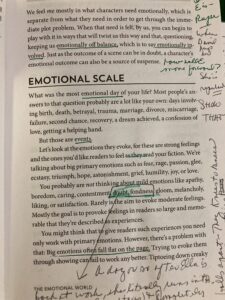


Writers! How we love to sit at the keyboard and write. How we often keep going back to rewrite, change. We focus on interesting vocabulary; the length and composition of our sentences; we enjoy using descriptive language (adjectives, adverbs); we sit back and smile when we have created flowing sentence structures that crystallize our thoughts, making them uniquely ours. We know that the ability to use and feel comfortable with our language is truly necessary. And as we continue to write, the vocabulary we use, the word patterns we create, our facility with different sentence forms all combine to become our writing style, our VOICE.
Donald Maass, literary agent and writing instructor, a guru in my life, states the following: Like it or not, the narrative voice in your novel (sub in story, article, essay) exists in time. Or, more precisely, in an era. It cannot help but pick up words, expressions, issues and attitudes that reflect both the times of the story and the times in which you live.
So, are you writing something historical? Maass states: Historical stories can be marred by anachronisms, but then again, the object of historical stories is not necessarily to perfectly reflect the dress, manners, speech and thinking of people of the time. If that were true, there would be no historical romances featuring hunky dukes. (Seriously, name one duke who would look like that, shirtless. Just one.) Maass stresses that as we write, our minds create sentences using the vernacular we are familiar with in our modern age.
KEEPING IT REAL
Maass also asks how we can avoid creating fiction that feels dated. Are there aspects of your story that will cause future readers to role their eyes? AND: what makes a story timeless, despite being written in a particular time? Is it possible to cut from your article or your fiction the clues to manners, morals and mindset of your own times, so that your work lasts for centuries without requiring footnotes? (Wow! That would be a dream come true!)
Maass also asks if we writers can create a VOICE and SENTENCES that will be read and understood a hundred years from now. I would answer yes. He stresses a skill we should all cultivate, be aware of: being TRUE to our characters, giving them their own lives, so that they are not copies of our own. Create characters that are unique and fresh. He also suggests that when describing your heroine’s hair style, a future reader might find your description laughable. So how to create a work-around? How to write fiction, create stories that will stand the test of time? ANSWER: focus on the STORY ITSELF.
Don’t worry about hairstyles. Focus on PLOT, the major points your story is making, the values it is presenting, the voices that come off the page. Maass lists writers whose work is fresh even today, whose work presents human problems, foibles, the struggles we can all identify with: Jane Austen, Edith Wharton, Charles Dickens, Mark Twain, Harper Lee, Zora Neal Hurston, Mary McCarthy… their work coming from times that are not modern, not particularly ours, but whose stories appeal to our humanity…because they are still about us!
FINALLY: do the narrative voices in the enduring books we read sound foreign to us? NO. Because their stories arcs are about love and loss, winning and losing…about human joy and pain, they are about us. That’s the lesson contained in THE EMOTIONAL CRAFT OF FICTION. Maass concludes: what makes fiction timeless is not the trappings of dress, manners, morals, transportation, communication, social issues. It is a story that is time-transcending, universal, always about human experience, human emotions. So go ahead, allow your characters or your narrator to be ANCHORED IN TIME….BUT ALSO allow him or her to be AN OBSERVER OF THE HUMAN SPECIES.
Write, create. Basic human nature doesn’t change much. Use your own experience. Create your characters with all their joys, sorrows and challenges. As Maass assures all writers: future readers will recognize these emotions, will be pulled into your story, feel and understand once again how it feels to be human.
P.S. Thanks to Donald Maass
And do consider purchasing, reading his helpful books, including, the Emotional Craft of Fiction

4 Responses
Always good advice. Something to consider…as we do our thing.
THANKS, CAROL.
I saw him once give a talk at a Writer’s Digest conference. Very interesting and informative. I agree, good writing is always very universal. That’s why it’s a pleasure to read. We see ourselves.
Lucky you. I have taken many of his classes online and he’s given me excellent feedback. And you are RIGHT: WE SEE OURSELVES.
Thanks, Laurie.